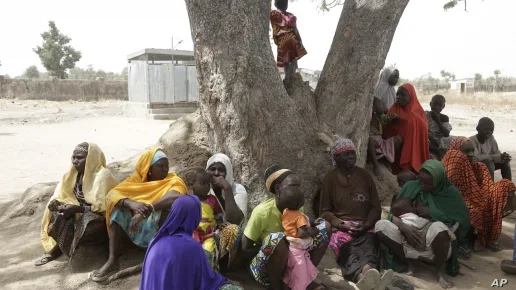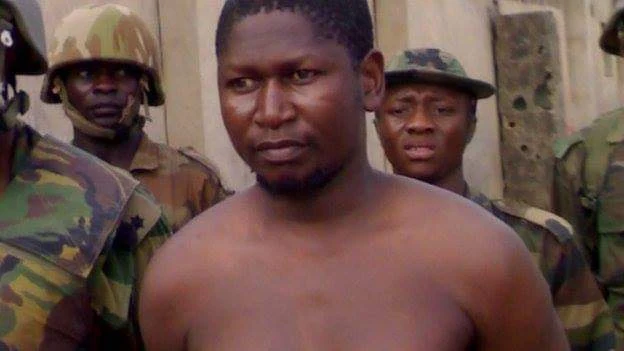 |
| An NAF jet on mission, after what began like a casual religious uprising in Bauchi got out hand! |
The day following quite breezy Monday morning of that year 2009, I headed for the park to board a bus going to Gombe. On we continued with the trip, until we were close to Jos ascending up the hilly terrain that will land us on top of the flat massive plateau.
Either we were close to Ryom town, or after we have passed it by, I excused from a co - passenger a copy that same Monday's edition of The Nation newspaper, to glance through. And the headline had it that the previous Sunday, fighting broke out in Bauchi township, courtesy of a religious sect.
 |
| Jos township; where I was close to, on a trip to Gombe before I read in a newspaper of how it all began |
To get to my destination in Gombe, I must of a neccesity pass through Bauchi township from Jos. Except I hire a chopper to fly over Bauchi!
I was on an humanitarian assignment, on the bill of a United Nations international non profit organisation. Had I heard of a fighting in Bauchi the previous Sunday night on news or read it in the newspaper early the following Monday morning before boarding the vehicle, maybe I would have changed my mind about the trip and headed back for Lagos.
 |
| Gombe township stadium: in Gombe, where I was heading to. |
Really, my friend in Abuja - Emmanuel Eboh, a complete gentleman who hate trouble with passion, would have done all he could to persuade me against the trip and even put me on a Lagos bound vehicle.
But am now between the devil and the deep blue sea. As the saying goes.
The rest of my anxieties at that moment, checkpoints of fiery looking soldiers nearly at each kilometre of the way, how the driver heightened my anxious tension when he disembarked all of us at Bauchi township, the very theater of war, to connect us to another vehicle going to Gombe, plus gory events that followed subsequent years later after the genesis of Boko haram, is now history. Ten years after....still counting!
Below are more reports of others who faced it for days, weeks, months and years, far and far more than I faced it that memorable Monday.
 |
| Internally displaced persons, in their camp. |
Ahmed Mohamed:
Maiduguri resident Ahmed Muhammed wanders through the rubble left behind as he recalls the outbreak of fighting in his city a decade ago that launched the Boko Haram insurgency in Nigeria.
“We heard shooting — badadadadadada — here, there, everywhere around us,” the 44-year-old railway worker said.
“We thought the end of the universe had come.” In late July 2009, tensions between the hardline Islamist sect and authorities in northeast Nigeria boiled over as the group launched a wave of attacks and security forces fought back ruthlessly.
The epicentre of the violence was the compound of the group’s founder Muhammad Yusuf.
After several days of fighting, Yusuf and hundreds of Boko Haram members were dead and a conflict had been unleashed that would devastate the region.
The mosque and the homes that once stood there are now just a pile of debris — an unmarked monument to the suffering of the past 10 years.
In the decade since the uprising began, some two million people have been uprooted from their homes and 27,000 killed as the bloodshed has spilt into neighbouring countries.
Boko Haram has turned vast swathes of territory into a no man’s land and forced its way into international headlines by abducting hundreds of schoolgirls.
While the Nigerian army has pushed the fighters from major towns, the jihadists have splintered into factions and spawned an offshoot aligned to the Islamic State group that has unleashed its own campaign of violviolence.
Hadiza Bukar:
Waves of the conflict crashed over Hadiza Bukar’s village near Baga close to the shores of Lake Chad in 2015 when Boko Haram fighters stormed through the area.
Bukar fled with her newborn twin sons, leaving behind her husband and two other children.
She has not heard from them since. What remains of the family is now among the roughly quarter-of-a-million people displaced and struggling to survive in and around Maiduguri, capital of Borno State. Studded across the city are government-approved camps and informal settlements of corrugated iron, sticks and shreds of tarpaulin.
The only place Bukar found to live is at the ground zero of the insurgency that tore her life apart. Her makeshift home stands on the edge of the ruins of Yusuf’s former compound.
When the downpours come in the rainy season the place turns into a quagmire.
“Many people told us stories about what happened here. They warned us there was a history,” she said, of the bloodshed in 2009. “But we had no option. We have nowhere to go. We decided to stay.”
Idrissa Isah:
Across town in another district Idrissa Isah, 45, scrapes by as best he can.
Maiduguri resident Ahmed Muhammed wanders through the rubble left behind as he recalls the outbreak of fighting in his city a decade ago that launched the Boko Haram insurgency in Nigeria.
“We heard shooting — badadadadadada — here, there, everywhere around us,” the 44-year-old railway worker said.
“We thought the end of the universe had come.” In late July 2009, tensions between the hardline Islamist sect and authorities in northeast Nigeria boiled over as the group launched a wave of attacks and security forces fought back ruthlessly.
The epicentre of the violence was the compound of the group’s founder Muhammad Yusuf.
After several days of fighting, Yusuf and hundreds of Boko Haram members were dead and a conflict had been unleashed that would devastate the region.
The mosque and the homes that once stood there are now just a pile of debris — an unmarked monument to the suffering of the past 10 years.
 |
| Ex - President Jonathan and Sheriff. Sheriff promised to show him the way out, but nothing came out of the unholy alliance |
Boko Haram has turned vast swathes of territory into a no man’s land and forced its way into international headlines by abducting hundreds of schoolgirls.
While the Nigerian army has pushed the fighters from major towns, the jihadists have splintered into factions and spawned an offshoot aligned to the Islamic State group that has unleashed its own campaign of violviolence.
Hadiza Bukar:
Waves of the conflict crashed over Hadiza Bukar’s village near Baga close to the shores of Lake Chad in 2015 when Boko Haram fighters stormed through the area.
Bukar fled with her newborn twin sons, leaving behind her husband and two other children.
 |
| Another set of internally displaced persons in their camp |
She has not heard from them since. What remains of the family is now among the roughly quarter-of-a-million people displaced and struggling to survive in and around Maiduguri, capital of Borno State. Studded across the city are government-approved camps and informal settlements of corrugated iron, sticks and shreds of tarpaulin.
The only place Bukar found to live is at the ground zero of the insurgency that tore her life apart. Her makeshift home stands on the edge of the ruins of Yusuf’s former compound.
When the downpours come in the rainy season the place turns into a quagmire.
“Many people told us stories about what happened here. They warned us there was a history,” she said, of the bloodshed in 2009. “But we had no option. We have nowhere to go. We decided to stay.”
 |
| Buhari; in fairness to him, bombings in the city stopped after he took over power, but rampaging killer herdsmen rubbished this achievement. |
Idrissa Isah:
Across town in another district Idrissa Isah, 45, scrapes by as best he can.
Isah used to send cows to Nigeria’s economic hub Lagos, but now all he has is a small patch of earth near his shack that a local landowner lets him till.
The little he grows helps supplement sporadic handouts from international aid groups and feed his family. He says he has had no government support.
Isah is desperate to return to his village of Makulbe about 30 kilometres (20 miles) from Maiduguri, but the risk is too high.
“If I could go back I would — I would have a big, big farm,” he said.
“There is no way I can.”
Isah is desperate to return to his village of Makulbe about 30 kilometres (20 miles) from Maiduguri, but the risk is too high.
“If I could go back I would — I would have a big, big farm,” he said.
“There is no way I can.”
– Attempted return –
Finding a way home for the displaced is seen as key to solving the humanitarian crisis in northeast Nigeria.
After forcing the jihadists back to remote hideouts, the government insists the security situation is stabilising.
 |
| Nigerian soldiers at Sambisa forest |
But attacks persist outside heavily fortified towns. Over just a few days in July, five soldiers were killed and six aid workers kidnapped.
On Thursday, a Boko Haram raid killed at least two persons in a displaced camp near Maiduguri.
So far this year, 130,000 people have been displaced in northeast Nigeria, the International Organization for Migration says. Ibrahim Bukar:
For Ibrahim Bukar, 48, is comparatively lucky.The local government accountant still receives his official salary of about $80 (75 euros) a month even though he has not worked in his hometown Bama, 65 km from Maiduguri, since it was devastated by fighting more than four yearsBut the wage does not cover rent and he squats with his wife and four children in the one-room servants’ quarters of an acquaintance’s house. “There was nothing,” he said. Last October, after more than four years away, he decided to go home.
 |
| Mohammed Yusuf; the founder and master minder of it all. But what will he and his sponsor or sponsors say on judgement Day? Or will their 7 virgins shield them from divine wrath? |
“No food, no potable water, no health services, no teachers — don’t even talk of electricity.”
Beyond the town, he said, you cannot travel safely for more than a kilometre. After three months, Bukar gave up and headed back to Maiduguri. The displaced camps are still filling up.
A sprawling site around the city’s main stadium opened in March and has already reached its capacity with over 12,000 people.But the wage does not cover rent and he squats with his wife and four children in the one-room servants’ quarters of an acquaintance’s house. “There was nothing,” he said.
 |
| Bauchi township: where it all began in broad daylight....... |
Last October, after more than four years away, he decided to go home.
“No food, no potable water, no health services, no teachers — don’t even talk of electricity.”
Beyond the town, he said, you cannot travel safely for more than a kilometre. After three months, Bukar gave up and headed back to Maiduguri. The displaced camps are still filling up.
A sprawling site around the city’s main stadium opened in March and has already reached its capacity with over 12,000 people.
Fatimah Mohammed:
Fatima Mohammed, 38, moved into a tarpaulin shelter three weeks ago with her husband and two children.
 |
| ......and later covered the land of Borno in a thick fog of darkness |
She arrived from an overcrowded camp not far away, having been displaced several times since being forced from her village five years ago.
She has no idea if, or when, she will seehome again.
“All depends on God — if there is peace I will go back immediately,” she said.
“But if there is no peace then there is no way I can return.”
Comments
Post a Comment